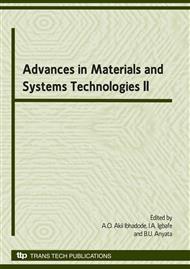p.374
p.380
p.385
p.393
p.398
p.404
p.415
p.420
p.426
The Dependence on Temperature of Carbonization and Chemical Activation on Characteristics of Granular Activated Carbon Characteristics
Abstract:
Nigeria imports large quantities of activated carbon annually for local use. In this study the development of low cost and effective adsorbent from the palm kernel shell for the treatment of waste water is examined.Palm kernel shells were used to produce activated carbon by carbonization at different temperatures (500 -10000C) and by chemical activation using 1M citric acid and saturated ammonium chloride as activated agents. The optimum temperature of carbonisation was found to be 950oC, the activated carbons produced were characterized. The measured characteristics: yield, pH, bulk density, surface area, porosity, resistance to mechanical abrasion and total surface charge of the activated carbon prepared from palm kernel shell were 18.6%, 7.8, 0.636g/ml, 112.09mgl2/gC, 19.23%, 2.36molH+/gC respectively, for citric acid activated carbon . For ammonium chloride activated carbon they were determined to be 17.50%, 8.55, 0.716g/ml, 109.69mgl2/gC, 19.76% and 2.06, 2.36molH+/gC respectively. The experimental results showed the possibility for the production of activated carbon with well developed pore structure, surface, and bulk density high mechanical abrasion and reasonable total surface charge.
Info:
Periodical:
Pages:
398-403
DOI:
Citation:
Online since:
February 2009
Authors:
Price:
Сopyright:
© 2009 Trans Tech Publications Ltd. All Rights Reserved
Share:
Citation:


